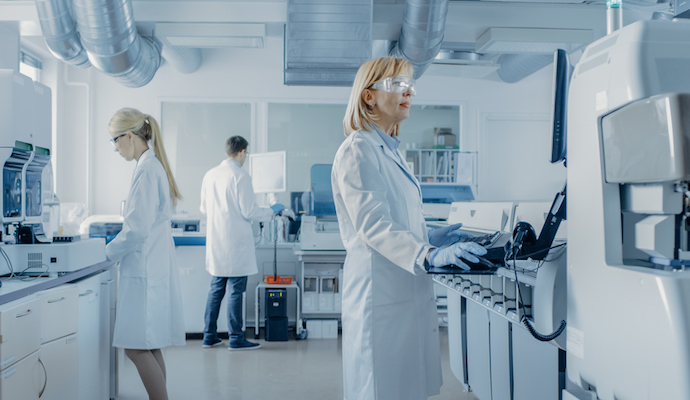HHS Launches Foundry for American Biotechnology to Spur Innovation
The nation’s first Foundry for American Biotechnology will engage regional experts, offer an idea lab, dry and wet labs and manufacturing space and create a commercialization program.

Source: Getty Images
- HHS launched on Monday the nation’s first Foundry for American Biotechnology for producing technological solutions that help protect against and respond to health security threats, as well as improve daily medical care and bolster the bioeconomy.
The HHS Office of the Assistant Secretary for Preparedness and Response is working in conjunction with the Advanced Regenerative Manufacturing Institute, led by Manchester-based DEKA Research & Development Corp., to shift the focal point for innovation in health security by spurring biotechnology innovation with the launch of the new foundry. The foundry will be managed as part of the public-private partnership and leverage DEKA's advanced technologies.
The first-of-its-kind Foundry for American Biotechnology is charged with engaging regional experts to offer labs, including an idea lab, dry labs and wet labs, and manufacturing space.
The wet lab space offers flexibility in sizing project needs and allowing project teams to bring in personnel, products, materials or supplies of their own. It supports developing manufacturing processes that comply with good manufacturing practices for products to enter the US market.
The Department of Defense, in December 2017, awarded $80 million in funding to the ARMI team for having raised more than $214 million in matching funds that initial commercial firms, academic institutions, and other sources contributed. More than 150 partners have joined ARMI to date. Asymmetrex, TheWell Bioscience and O2M were the last to sign on as partners.
READ MORE: CEPI Pushes for Vaccine as Coronavirus Spreads
With the race for a vaccine against the outbreak strain still ongoing, HHS Secretary Alex Azar points to the novel coronavirus outbreak as a reminder that “protecting the health and security of the American people requires constantly investing in biotechnology innovation and partnering with the private sector.” Azar touts the creation of the nation's first Foundry for American Biotechnology in New Hampshire, as "a milestone achievement in the innovative work that ASPR has done to support America's development and manufacturing of medical countermeasures.”
DEKA will offer its rapid prototyping capability to the foundry's projects under the partnership agreement, too. With the foundry's new learning zone, developers can also access to DEKA's industrial design capabilities as well as the company's modeling and simulation technology.
The foundry will lead to creating and managing a commercialization program that will engage private-sector partners to speed up the adoption of new breakthrough technologies.
The ASPR, along with a public-private consortium, will determine funding to commercialize the projects and attract more private sector funding. The first consortium partners will include representatives from the industrial pharmaceutical sector and the industrial automation sector.
The new foundry “represents a game-changer in driving technologies critical to saving lives in disaster response," says Assistant Secretary for Preparedness and Response Robert Kadlec. "By providing essential services that move biotechnology from bench to bedside, the foundry not only solves problems the nation faces in health security, but also boosts the US bioeconomy."
READ MORE: Biotech to be ‘Extremely Active’ in 2020 Mergers and Acquisitions
The approach looks to have the technologies quickly integrated into daily medical care and available in a disaster response, including for pandemics or a bioterrorism incident. Its commercialization program is also seen as an opportunity to reduce the need for stockpiling of medications, vaccines, diagnostics, equipment and supplies and thus create cost savings.
All state governments have stockpiles under a federal government program to respond to large-scale emergencies—including floods, hurricanes and influenza pandemics—and support small-scale deployments to treat individuals with life-threatening infectious diseases like smallpox.
Joe Hamel, ASPR's strategic innovation and emerging technology manager, explains that "the countries in which active pharmaceutical ingredients, medications, and vaccines are produced could require manufacturing companies to provide the medications or vaccines to their own country before manufacturing and delivering products to other countries" during global health emergencies. "Medicines on demand technology eliminates this complication, which would greatly decrease our emergency response time and help secure the US supply chain," he says.
The move is further expected to boost an ASPR area of interest, dubbed the Priority Medicines on Demand program. The vision for the program entails producing products at the point of need.
To kick off the foundry, the focus of the first project will be centered on maturing and validating automated devices that can be easily transported to disaster locations to make medicines on-site.
READ MORE: GAO Backs Machine Learning in Drug Development
Technology will be transitioned to the foundry from the Defense Advanced Research Projects Agency’s Battlefield Medicine and Make-It programs, as part of a new partnership between DARPA and ASPR, for developers to use. “The DARPA partnership with ASPR is poised to provide the initial demonstration of automated, on-demand capabilities for distributed production of medicines, an important enabling capability for both the military and civilian sectors," says Anne Fischer, a program manager within the Defense Sciences Office at DARPA.
The ASPR is accepting proposals to use foundry for developing solutions through September.
